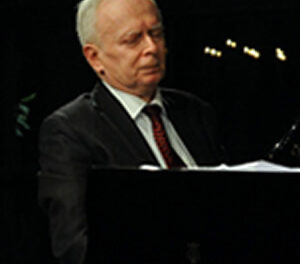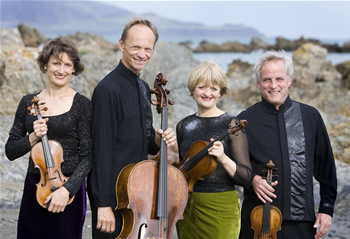It was not your average folk and patriotic music concert. “This Great Land,” presented by the Chamber Choir of the NC Master Chorale in Peace College’s Kenan Recital Hall on May 20, also included representative scenes of nature and geographical images of great variety that can be found across America. The program invoked themes of thanksgiving and thoughts of peace. Introducing this focus was “The Promise of Living,” from Aaron Copland’s The Tender Land . From its soft beginning, the vocal dynamics rose to the forte of fulfillment.
Highly recommended for repetition in future programming is the poetry of Louise Bogan, set to music by David Ashley White (b.1944). Music Director Alfred Sturgis made a most interesting presentation of the finer points of White’s interpretation of the poetry before conducting the work. There are five poems with the umbrella title of “The Blue Estuaries.” Sturgis selected a motif from each of the verses and explained what to listen for before the piece was presented. This is a very thoughtful way to introduce music that is itself relatively new. His personality made it fun and not pedantic.
“The Blue Estuaries” conjure up a focus on the promises of America. The first, “Evening Star,” opened with a virtual gasp at the sight of the light from Venus, the real thing having been witnessed recently following another Triangle concert, so the image was very close and easy to grasp. The second, “I Saw Eternity,” came in contrasts, light and bright, and led to the expectancy conveyed in “Forever.” The poem “To Be Sung On the Water” came next; it could be compared with Samuel Barber’s setting, also presented. Suffice it to say that both invoked the thought of various expanses of water in this great land. This one began with very lovely subito-piano vocal work and contained equally beautiful, quiet and pensive harmony throughout.
Sturgis had noted the repetition of the word “Back” at the beginning of each of the twenty lines of “Train Tune.” The rhythm created by this repetition suggested the chug of a train and its acceleration. It was described with “overlapping entrances” to offer a “seamless ride.” A deliberate rallentando created a suspenseful quieting at the end. The last poem, “Night” begins, “The cold remote islands and the blue estuaries,” and Sturgis had alerted the audience to watch for the climax where the pulse is renewed in an A major chord. The lovely interpretation ended with “…O remember in your narrowing dark hours/That more things move/Than blood in the heart.” Truly the music moved the spirit.
Three Barber works including the one already mentioned, “Sure On This Shining Night,” and from Vanessa , “Under The Willow Tree.” Soprano Erin O’Hara was soloist in the last of this group, and set the scene beautifully before the chorus entered. “A Glimpse of Snow and Evergreen” by Vijay Singh provided an inclusion of winter mountain scenes possible to envision across America and that made the programming point well: this was a well-built collection of works that accomplished the goal very nicely.
After intermission, “Make Our Garden Grow” from Leonard Bernstein’s Candide picked up the exciting program tour of the USA and culminated in a nice fortissimo close. “Simple Gifts, arranged by René Clausen, ends with the last verse shattered, like fading fireworks; it was glorious! James Erb’s version of “Shenandoah” featured alternating unison statements by women’s and men’s voices, nicely realized.
Next came Z. Randall Stroope’s “In Time Of Silver Rain,” with Michelle Hile, managing director of NCMC, joining the evening’s strong accompanist, Susan McClaskey Lohr, to form a the piano duo; Hile also played for “The Promise of Living.” The great teamwork was subsequently recognized by the conductor. Flutist Amy Grigg played the introduction to Carol Barnett’s arrangement of “Red River Valley”; the audience had been warned that the close harmony was intentional and that the chorus was not drifting off key… Lively , crisp harmony describes “Ching-a-ching Chaw” by Aaron Copland.
For “Down In The Valley,” arr. George Mead, the men of the chorale moved to the front row and the women scrambled to hide behind them, and the audience was treated to the clear sound of men’s voices. There is a singular resonance to the sound of men’s voices, offering reason for the perpetuating of choirs of men and boys, despite charges of political incorrectness. There is a very distinct place for men’s voices in the music repertory.
When the women reappeared, the chorus assembled in quartets for the balance of the program. Mark Hayes’ arrangement of “Home On The Range” showed the North Carolina Master Chorale to be very strong in the a cappella medium; the soloist was John Butler. This preceded the patriotic final numbers, “An American Hymn,” arr. Cecil Effinger, and “America,” arr. Robert Hunter. The first of these gave new appreciation of the traditional “America the Beautiful, ” and there was especially nice piano accompaniment by Lohr. The second was a rabble-rouser of an arrangement. The “belt voice” alto soloist, whose name did not appear in the program, succeeded in representing “Everywoman,” the voice of America, as she presented one verse of the patriotic hymn. Although it was not what I would have expected at this point, it was exciting and it created a good image. In conclusion, the chorus shouted and the piano banged, but the resonance was missing – perhaps this was an acoustical problem.
During the entire concert, I marveled that even though I had heard last year’s French program by the Master Chorale and enjoyed them with the Carolina Ballet, I didn’t recognize a distinctive “sound” that would tell me that I was listening to the same ensemble. It was as if this were just another wonderful Triangle area chorus. My conclusion is that, due to acoustical variations, any local choral group may achieve greater consistency if presented in the same venue from season to season. Yet this does not explain the success of touring choirs, so the point may be moot. In any event, the audience went out energized after yet another wonderful evening of Triangle singing.












